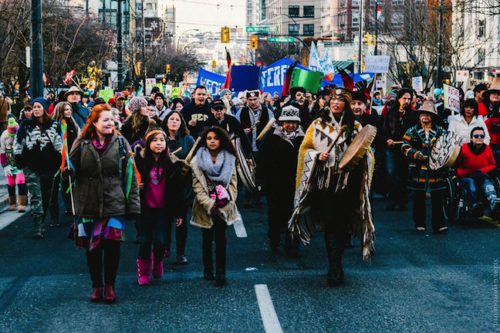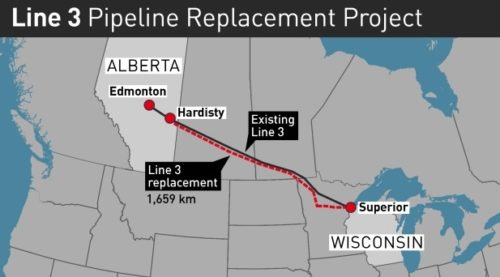CANADA – On Nov. 29, Prime Minister Justin Trudeau made an announcement that the Canadian federal government was going ahead and approving two highly controversial pipeline projects. Kinder Morgan’s Trans Mountain pipeline project and Enbridge’s Line 3 project, could see as much as a million barrels more per day of various petroleum products from Alberta’s oilsands traveling through Canada, to the West Coast, and also over the border, into the United States.
A third project, the Northern Gateway pipeline was rejected. This was a victory for protesters, as this pipeline would have crossed an environmentally sensitive area known as The Great Bear Rainforest. This 21 million acre forest is part of the largest coastal temperate rainforest on Earth. It is home to wolves, salmon, whales and the most elusive resident, the Spirit Bear. These are black bears with a recessive gene that makes them as white as a polar bear. They are sacred to the Tsimshian First Nations people, who live in the area.
!['Spirit Bear' of Canada [Courtesy Wikimedia]](https://wildhunt.org/wp-content/uploads/2016/12/Ursus_americanus_kermodei_Spirit_Bear_Lodge_Klemtu_BC_2-500x334.jpg)
‘Spirit Bear’ of Canada [Courtesy Wikimedia]
In his statement rejecting this particular pipeline, Trudeau said, “It has become clear that this project is not in the best interest of the local affected communities, including Indigenous Peoples.” He added, “The Great Bear Rainforest is no place for a pipeline.”
The two approved pipelines will still face challenges before they can be built.
In a press release, Greenpeace campaigner Mike Hudema stated “If Prime Minister Trudeau wanted to bring Standing Rock-like protests to Canada, he succeeded.”
One activist willing to do whatever it takes to stop these projects is Sparrow, co-host of popular pagan podcast, The Wigglian Way. Her particular focus is the Kinder Morgan Trans Mountain pipeline. Currently, the plan for the project is to twin an already existing pipeline that runs from Edmonton AB, through the Rocky Mountains to a terminal in Burnaby, BC. This will nearly triple its capacity to 890,000 barrels a day.

Sparrow (front row, left) leading march as a peace bearer [Courtesy Photo]
“They will also expand that tank farm. Not only will they expand how many tanks will be on there, but they are expanding the size of the tanks. If there is a spill over, or if fumes are released or a fire, this neighbourhood and Simon Fraser University, at the top of the mountain, are in grave danger. There is only one road in, and one road out.”
The Trudeau government has been making some strides in improving Canada’s status as a green-conscious country. Once a world leader, Canada’s ranking fell under the previous government, led by Stephen Harper. Leading up to the pipeline announcement, Trudeau announced plans to overhaul the National Energy Board, the country’s regulator, and also impose a new carbon tax and phase out coal-powered plants by 2030.
In light of this, it surprised many that the two pipelines were approved. Sparrow was standing by when the announcements were made. She says, “I was watching it when it happened, and I know that I screamed out a number of times ‘NO NO NO!’
“I was astounded that he had approved it, that there was no other process going through. How could a climate leader build a pipeline? It doesn’t make sense. He talks about carbon tax and he talks about all these things that will help the environment, and then he approves the pipelines.“
The Enbridge Line 3 Project has garnered the least amount of attention, despite being the largest project in the history of the company. It will be 1,659 kilometres long, and will carry oil from Hardisty, AB, across Saskatchewan, through southern Manitoba, into Minnesota and on to Superior, Wisconsin. It will double an existing pipeline’s production to an estimated 760,000 per day.
The current pipeline has seen a series of spills since it was built in the 1960s, and Enbridge has had to cut production in attempt to address maintenance issues. This existing line will be deactivated once the new line is fully operational.
One of the strongest arguments in favour of the pipelines is that building and running them will strengthen the economy, and create jobs. On the Trans Mountain pipeline project, Kinder Morgan forecasts the expansion will create 15,000 jobs a year during construction, and a further 37,000 direct and indirect jobs for every year of operation.

[Source – Enbridge, Government of British Columbia]
The most emotionally charged and fiercely debated of the projects is certainly the Trans Mountain pipeline, as this expansion touches so many communities. Sparrow has concerns for the security of her neighbourhood.
“My main one is the elementary school children, the school is 100 metres from the tank farm, and for Simon Fraser University. And then I worry about the water quality in our neighbourhood. What happens when there is a spill, and our tourism industry, or seafood industry, totally flops?”
Sparrow is confident that the community is against the pipeline expansion, and that it won’t go through: “I think that in this neighbourhood and this city, people are making the pledge to stand with Indigenous people to do whatever it takes to stop Kinder Morgan.”
The City of Burnaby does not believe it will help the local economy, and has issued a statement in opposition to the pipeline. The mayor of Vancouver, Gregor Robertson, has also been outspoken in his opposition to the plan.
Backlash against the pipeline spread as Green Party leader Elizabeth May was quoted in the CBC News as saying that she is “willing to go to jail” to stop Trans Mountain’s construction. Canada’s Natural Resources Minister, Jim Carr, responded to this and publicly stated that “unruly protesters” would be dealt with by military force, a statement for which he later had to apologize publicly. The Canadian military reported to the National Post that they had no such response planned.
When asked how far she is willing to go to protect the environment from the Trans Mountain pipeline expansion, Sparrow says, with a sigh: “It will not happen. It can’t. Over my prone, and difficult to move body, that may be locked to some sort of equipment. I am prepared for that.
“It will be like the Northern Gateway project, it will be shut down. There are so many people here, and throughout the world, that are prepared to lay their body down in front of a tractor, or lock themselves to a machine so that it does not happen.“
Sparrow approaches activism as a form of ritual worship for the Earth. She explains, “Before I go to any action, march or rally, I prepare myself and I cleanse myself. It’s just like circle. Then I go to the action and I am in ceremony. This is my worship of Gaia. I work for Mother Earth and my spirituality and activism are the same thing.”
She is not affiliated with any one group in particular, but she has worked with Greenpeace, BC Sea Wolves and Dogwood and other community groups.
Construction of the Trans Mountain project is scheduled to start in September 2017, and it should be fully functioning by December 2019, unless protests and possible court actions are successful. Kinder Morgan must also meet the National Energy Board’s 157 conditions, including 49 environmental requirements.
The Wild Hunt is not responsible for links to external content.
To join a conversation on this post:
Visit our The Wild Hunt subreddit! Point your favorite browser to https://www.reddit.com/r/The_Wild_Hunt_News/, then click “JOIN”. Make sure to click the bell, too, to be notified of new articles posted to our subreddit.